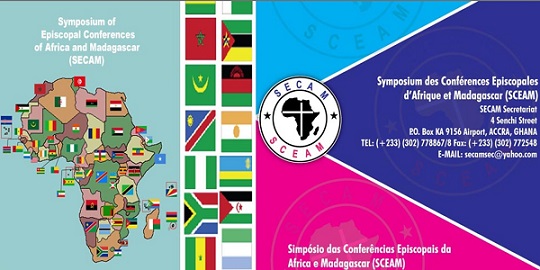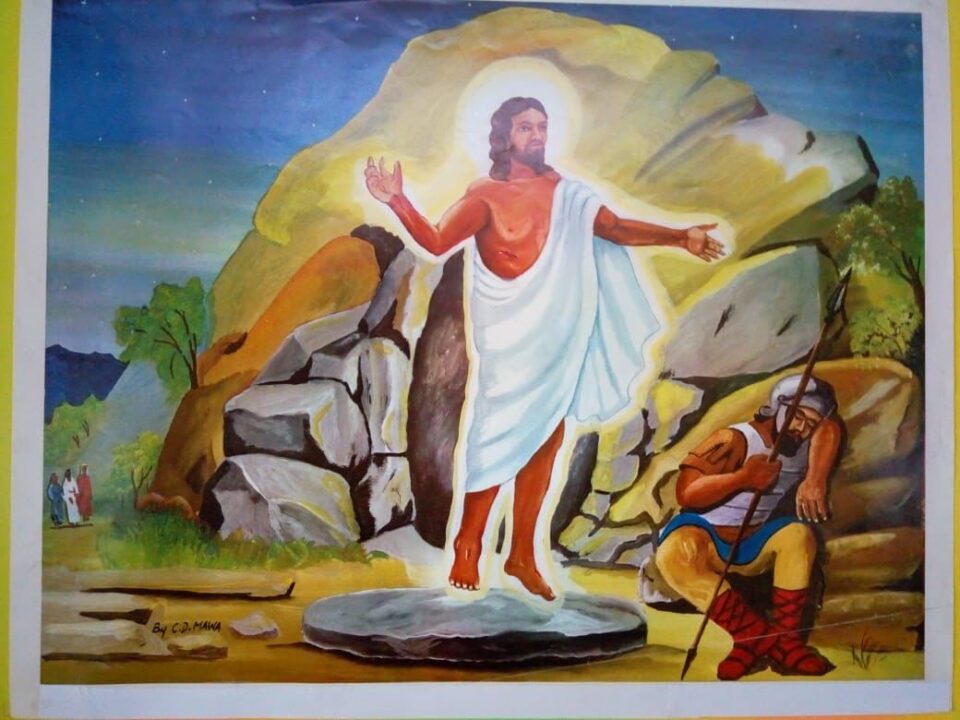- Contact us on - Contactez-nous sur - Contacte-nos em
- +233-30-277-8867/8
- +233-30-277-2548
- secam@secam.org
Bishops in Africa Set to Launch Yearlong Golden Jubilee Celebration of Continental Conference in Uganda
Bishops in Africa Set to Launch Yearlong Golden Jubilee Celebration of Continental Conference in Uganda
CANAA || By Father Don Bosco Onyalla, Nairobi || 19 July 2018
 Catholic Bishops in Africa under their umbrella body of the Symposium of Episcopal Conferences of Africa and Madagascar (SECAM) are later this month set to launch a yearlong golden jubilee celebration to mark the establishment of their continental conference.
Catholic Bishops in Africa under their umbrella body of the Symposium of Episcopal Conferences of Africa and Madagascar (SECAM) are later this month set to launch a yearlong golden jubilee celebration to mark the establishment of their continental conference.
The five-day event to be hosted by the Uganda Episcopal Conference (UEC) is set to take place in the outskirts of Uganda’s capital, Kampala, at Speke Resort Hotel and Conference Centre, Munyonyo from Thursday, July 26 through Monday, July 30.
“The church in Africa, 50 years ago, took the historical initiative to constitute herself as the Symposium of Episcopal Conferences of Africa and Madagascar (SECAM) at Kampala in 1969,” reads in part SECAM Golden Jubilee Instrumentum Laboris (Working Document) shared with CANAA ahead of a series of planned activities.
The objective of SECAM Golden Jubilee is “to celebrate in thanksgiving God’s wonderous deeds, His gift of baptism and of the Church; to reflect on the progress made so far, with the aim of deepening our faith, rooted in Christ, and to resolutely engage ourselves in the mission of proclaiming the gospel in words and actions”.
Some of the activities planned during the five days include prayer sessions, a series of workshops on Instrumentum Laboris divided in six sessions, a meeting of SECAM Presidency, Treasurer and Secretaries General, an extraordinary meeting of SECAM Standing Committee, a meeting of staff from SECAM and UEC Secretariats, among other activities.
The Eucharistic celebration to officially mark the launch of the Jubilee celebrations has been planned for Sunday, July 29 at St. Mary’s Cathedral, Rubanga.
The Golden Jubilee will be launched under the theme: Church – Family of God in Africa, Celebrate your Jubilee, Proclaim Jesus Christ your Savior.
Participants will have time to visit the Uganda Martyrs’ Shrine at Namugongo, where they will have their evening prayers on Sunday, July 29.
Those set to take part in the five-day program include members of SECAM Standing Committee, representatives from Regional Bishops’ Conferences, UEC, CARITAS Africa, staff from the Accra-based SECAM Secretariat, COMMITHEOL facilitators, SECAM Canonist, members of the media, and a team of translators.
“In celebrating the Golden Jubilee of SECAM, each faithful, every Christian community in Africa and Madagascar, is invited to let the call to this mission resonate in him/her and respond to it with zeal,” the Working Document reads.
On the occasion of the establishment of SECAM in Kampala in 1969, “Pope Paul VI came and confirmed the Church in Africa in her faith, and declared: You Africans, you are now your own missionaries; You can and ought to have an African Christianity.”
Below is a summary of the year-long SECAM Golden Jubilee list of activities contained in Instrumentum Laboris
SECAM Golden Jubilee Activities
Thanksgiving for:
- The Church-Family of God, community of faith.
- Our identity as baptized people and our mission as witnesses to the Gospel.
- The gift of the Eucharist which brings us together, sanctifies, strengthens and commits us to become “Eucharist” so that others through us may have life in fullness.
- SECAM and all the other structures and ecclesial institutions within Church for the past 50 years.
- The pastoral and social works that have enabled the Church to be close to those in need: (Mt 25:31-46)
- Cultural and educational works.
Memories of the accomplished path
Identifying the initiatives or activities of the Church-Family of God at all levels: personal, family, parochial, diocesan, national, regional and continental (successes, failures, joys and difficulties encountered).
- How do we, in our families, parishes, religious congregations, nations, regions, and continent, acknowledge the progress made by the Church-Family of God?
- What measures have we put in place to promote justice, reconciliation, peace and development and to help internalize, assimilate and testify truly that we are God’s Family?
- What mutual support do we offer each other in response to the fact that we are the Church-Family of God?
- What kind of spiritual and material resources do we dispose of?
Repentance and Conversion
- Identify the activities to be undertaken towards the way of repentance and conversion in our daily life
- Promote personal and community approaches of forgiveness,
- To be aware of our shortcomings and negligence in acknowledging and developing the immense human and natural resources of Africa in favour of our populations.
- Recognize the strengths and weaknesses of the methods of evangelization used till today and to update the necessary pastoral initiatives.
- Develop activities for reconciliation and unity at all levels: family, Christian communities, villages, regions, countries and continent.
Renewed commitment to bearing witness to Christ
- Renewing our life with Christ
- Strengthening the sense of personal responsibility to the Gospel among the lay faithful, the Religious and the pastors.
- Organizing formation sessions to deepen our knowledge of Christ and his Gospel
- Identifying socio-cultural and economic barriers to responding to the demands of the Mission.
- Rethinking and promoting the involvement of Christians in political life.
- Developing, in institutions of formation (universities, seminaries, novitiates, and associations), initiatives of communion and action for deeper evangelization and transformation of society.
- Promoting an organic solidarity among ecclesial service structures in a spirit of subsidiarity and complementarity (cf. Pauline image of the church as body of Christ).
- Promoting some pastoral actions or strategies, according to the Social Doctrine of the Church, proper to different groups and associations as well as socio-professional institutions (family businesses, cooperative structures, community groups for economic purposes, etc.), in view of integral human development.
- Recognizing and promoting the roots and cultural values of Africa to meet the major challenges for her transformation.
- Indicate the commitments to be promoted in order to further respond to the mission of the Church-Family of God.
- Identify the strengths and weaknesses of the Church-Family of God, as well as the opportunities and threats for a far-reaching evangelization.
- Stimulate and encourage ecumenical actions and Interreligious Dialogue.
- Remember that the grace of God is gratuitous and dismiss any aspects of simony in the celebration of the sacraments and sacramentals.
- Create awareness for pastoral care of the needy (sick, old, prisoners, refugees, migrants, etc. (Lk 6: 17-19).
- Strengthen pastoral care for the children and the youth


